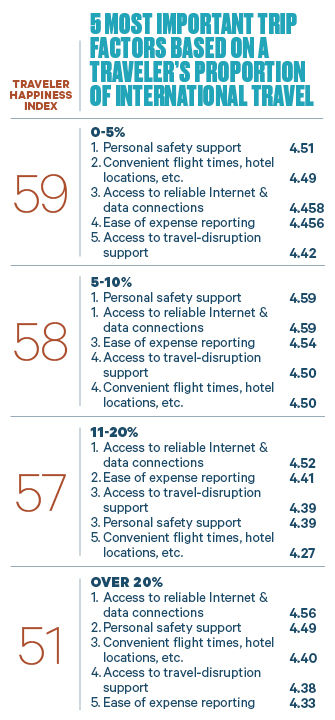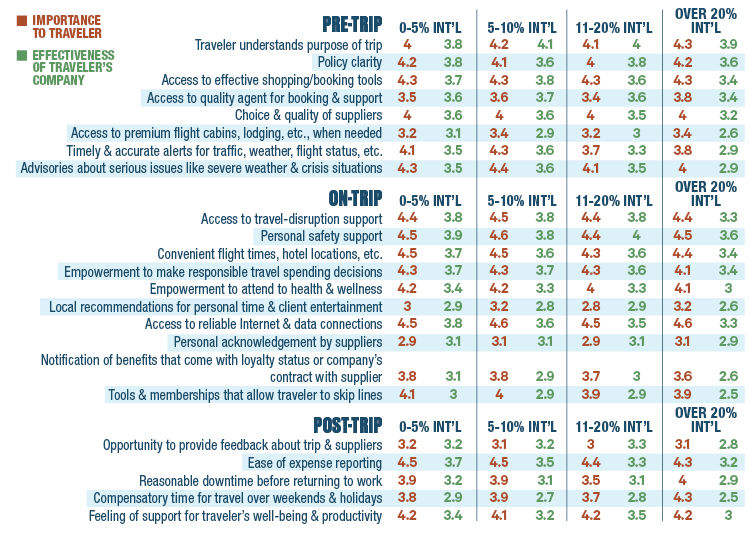
BTN's Traveler Happiness survey showed that the more
international travel a company's employee does every year, the more challenging
it becomes for the company to produce a positive traveler experience. Employees
whose international trip volume edges past 20 percent reported one of the
lowest overall Traveler Happiness Index scores of any group of travelers in BTN's
study, at 51.
Personal Safety
Personal safety not only was among the three highest priorities
for all international travelers, it also was an area where many felt a gap in
program support, especially in terms of pre-trip travel advisories about
serious incidents. This problem was most pronounced for those that travel
abroad the most.
Traveler safety and security support runs much deeper than
messaging, and several international travelers BTN interviewed cited political
unrest, hijacked flights and sexual harassment. Lack of training in how to
react left them feeling vulnerable. An HR professional was in Cairo in 2011
during then-President Hosni Mubarak's ouster. With Internet and cellphone
services shut down, his credit cards were useless. The company had advised him
not to carry cash to Egypt, but he brought it anyway and used cash bribes to get
to the airport. While his company regularly briefed employees on travel safety
strategies prior to foreign travel, he said, "somebody dropped the ball;
they should have told us not to fly to Egypt. It took us three days to get
evacuated." He now registers with an embassy before traveling
internationally, as this helps with evacuations. His company, in turn,
established a team to improve its travel crisis response.
Highest-Impact Opportunities
The trip factors that travelers deem most important, which
BTN has listed in the table above, don't tell the full story. For that, travel
managers need to know how well travelers think their companies are doing at
these and other trip aspects. To get an idea of what we mean, scroll to the
Traveler Perceptions table at the bottom and look at the post-trip factors for
travelers who go abroad more than 20 percent of the time. They rated two
factors at 4.3 on a five-point importance scale. For ease of reporting,
travelers rated their companies' performance at 3.2. That's a 1.1-point gap
that spells opportunity. An even bigger opportunity, though, is the 1.8-point
gap for time off to compensate for travel over holidays and weekends.
The most important factors with the biggest gaps
between importance and delivery are your biggest opportunities. Dig around in
the Traveler Perceptions table at the end of each Travel
Program Opportunities story for more.
A 31-year-old events director who travels internationally 10
times a year is new to traveler safety and security measures. "Until
recently … I'd never had a briefing on any of that stuff. There were no updates
on what one might expect to happen in a [particular] country or know-how to
deal with [emergency] situations," she said. "In the past nine
months, [the company] brought in International SOS, so [now] they do security
training and briefings for countries and what to do in hostage situations."
However, she feels her company is still behind when it comes to women's safety.
Her company has many trainee programs for recent graduates, which means women
in their early 20s are "expected to travel by themselves or with one other
person, often a male colleague, and expected to interact with people who can be
inappropriate and make them feel uncomfortable," she said. "[The
company] could do a lot more to prepare women or people in general for the
realities of client-facing roles."
Facebook traveler security is addressing issues like these
by rolling out training to all employees who travel, and talking candidly about
the concerns of women travelers, first-time travelers and LGBTQ travelers among
others. Facebook does not limit its education to members of particular groups. "It's
not just educating the traveler," said global travel manager Erin Wilk. "It's
about providing an informed environment where travelers and managers can come
together on concerns."
Mission Critical: Internet Connectivity
Employees who travel internationally more than 20 percent of
the time were the most dissatisfied with access to reliable Internet and data
connections, according to the survey. Though access has improved with inflight
Wi-Fi, not all companies are willing to reimburse for it. Hotel Wi-Fi,
meanwhile, can be spotty, particularly during international travel. And ad hoc
mobile data connections can be expensive. A pharmaceuticals project manager who
travels internationally at least 25 times a year said she'd be more productive
if her company simply provided a Wi-Fi dongle. "If I want to do anything
on the Internet, I have to use my [personal] phone Wi-Fi. They reimburse me,
but it's a pain because I may run out of data [for personal use later],"
she said.
Foresight for Wi-Fi & More
Microsoft has introduced a travel
community tool on the Tripism platform whereby corporate travelers can rate
hotels, restaurants and other local market suppliers based on firsthand
experiences. That advice can include details like Wi-Fi reliability and other
priorities like onsite fitness facilities, hotels' proximity to public
transportation, restaurant recommendations and other information. One drawback:
The community exists outside the booking tool.
Other solutions have come to the market, too. Expedia
incorporated RouteHappy's flight sentiment data in 2014 that reviews seat
amenities; Egencia got it in 2015. After Deem acquired hospitality
data-cruncher Olset last year, Deem Work Fource pulls more sentiment and amenity
info into its booking process. Meanwhile, Kayak co-founder Paul English
launched his lightweight mobile corporate travel booking tool, Lola, which also
pulls in external sentiment data. Managed travel announcements will come soon
from Lola.
Expense Reimbursement
Organizations can stand to do more to ease the process for
travelers, according to BTN's Traveler Happiness survey. Of the three travelers
with whom BTN spoke whose companies migrated from manual expense reporting to
Concur Expense, two said their processes had improved. "It makes it much
more convenient. I no longer fear losing receipts, and I don't have to scan and
staple [receipts]. It was like putting together a jigsaw puzzle," one
traveler said. The third admitted she could be better about photographing
receipts as she goes along, rather than waiting three to six months to file
expenses, which results in an entire evening of personal time to submit them.
Improvements also could start not with the expense tool but
with corporate card decisions. For example, the pharmaceuticals project manager
said an administrator books her flights and hotels. This eliminated her need to
charge big-ticket items to her personal credit card and removed line items from
her expense report. Finance may call the shots for corporate cards, but travel
managers could influence the decision.
Companies also can assess receipt policies. A government
employee who travels mostly domestically said a per diem and the requirement to
submit receipts only for charges over $75 ease her expense reporting process.
Plus, less stringent receipt policies can benefit not just the traveler but
also the company. Siemens Corp. recently revised its U.S. receipt policy to a
$75 floor for corporate card purchases and $25 otherwise. The new policy
reduced receipts handled by 1.3 million annually and is projected to save the
company 30 man-years in labor every year.
Frequent International Travelers
All international travelers were dissatisfied with their
access to memberships or tools that allowed them to skip lines or bypass
typical travel processes, such as airport security and hotel front desks.
Again, more frequent international travelers were the most dissatisfied,
according to BTN's survey. Global Entry's $100 price tag, which covers five
years and automatically qualifies travelers for TSA Precheck, could be a small
price to pay for a consistently upgraded experience.
The most pronounced factor leading to dissatisfaction among
heavily international travelers was a lack of compensatory time for traveling
over holidays and weekends. They rated its importance at 4.3 out of 5 but
pegged their companies' ability to deliver at just 2.5. Likewise, they ranked
the need for their companies to support their well-being and productivity while
traveling at 4.2, but they rated their companies' performance at only 3 out of
5.
Traveler Perceptions on a Scale of 1 (bad) to 5
(good)
